Le Pen seeks Macron's downfall in French European polls
The election will see voters across the European Union cast ballots for party lists
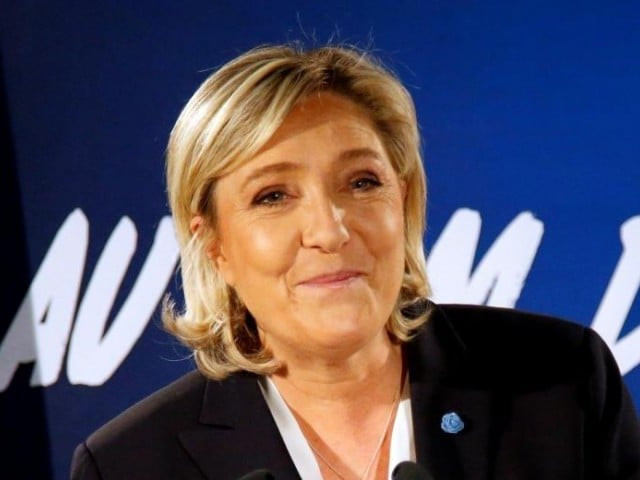
Marine Le Pen PHOTO: REUTERS
Two years ago, the 50-year-old lost to French leader Emmanuel Macron in a bitter presidential election that left her physically exhausted and facing questions over her future.
But after a break, a re-branding exercise of her party -- previously known as the National Front -- and an overhaul of its programme, she has campaigned since January with the head of state in her sights.
In European parliament elections in France on May 26, she sees the chance not only to deal a blow to Macron's faltering presidency, but for her ideas to move further into the political mainstream.
"Everything has changed," she said in an interview with AFP last week in the parliamentary office she has occupied since winning a seat in the National Assembly two years ago.
Macron sparks Turkish anger by meeting Syrian Kurds
"Before we were on our own on the European scene... we didn't have any allies. But in the space of a few months, a whole range of political forces have risen up in spectacular fashion," she said.
In the last year and half, parties who share her anti-immigration and anti-EU positions have entered governments in Italy and Austria, while making gains in parliaments from Berlin to Stockholm and even Madrid.
France has been the exception, where Macron and his new centrist, pro-European party Republic on the Move kept the populists out of power in 2017.
Le Pen has called for the European polls to be a referendum on Macron's term just as the 41-year-old looks to recover from six months of anti-government protests by "yellow vest" demonstrators.
"At the national level, if he comes out on top, he will obviously draw an illusionary sense of legitimacy and start what he has called the 'Second Act' of his term," Le Pen said.
"So I am saying to the French: get in his way, I beg you. Stop him by voting for the only party list in front of Emmanuel Macron," Le Pen added.
Polls show Le Pen's party, now named the National Rally, winning about 22-24 percent the election, a slight edge over the centrist alliance that includes Macron's party.
The election will see voters across the European Union cast ballots for party lists, with the share of votes then determining how many MPs on the list are sent to the European parliament.
Under the changes pushed through by Le Pen, the National Rally has ditched its long-standing policy of wanting to leave the EU -- a so-called "Frexit" -- and its proposal to abandon the euro common currency.
Instead, she proposes unpicking the bloc from the inside, rolling back its treaties and common rules and turning it into a "union of nation states" who act independently.
"We took into account what the French people told us," she said. "They don't want to leave the euro, but that does not mean we can't improve it."
Far-right nationalists are expected to make gains in the European election, with Le Pen tipping her alliance -- the Europe of Nations and Freedom (ENF) -- for 80-120 out of 751 seats.
Polls show it likely to finish fourth, with around 70-80 seats, around double its current number.
"It's something historic, but it is not just in the European parliament where things the going to change," she said.
"One thing is certain: this insane rush in the European Union towards federalism has been stopped," she added.
But despite the confident tone and the advances for some of her partners -- mostly the League party in Italy -- Le Pen faces political risks of her own.
Her performance in the presidential election, particularly a bungled televised debate, has not been completely forgotten and her reputation is on the line as well as Macron's.
"Of course I would be disappointed (not to come top in the election)," she said. "I'm fighting to win it."
Projections for the National Rally in France, with its list led by 23-year-old Jordan Bardella, show it could end up below its level in 2014 when the National Front came top with 25 per cent.
Le Pen has also had difficulties finding allies despite her dreams -- and those of Donald Trump strategist Steve Bannon -- of forging a pan-European "supergroup" of ultra-nationalists.
The hard-right eurosceptic ruling party in Poland -- PiS -- has shunned her over her pro-Russian stance, while Hungary's Prime Minister Viktor Orban has also spurned her advances.
Austria's Freedom Party (FPOe) meanwhile became embroiled in a major corruption scandal over the weekend.
And in proposing to stay in the EU and keep the euro, she has been accused of flip-flopping and has given her opponents a new line of attack.
The top candidate from Macron's party, Natalie Loiseau, has accused the National Rally of being contradictory.
"Everything that you propose means as a consequence that you will leave the European Union. Why can't you say it?" she asked last week.

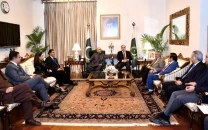
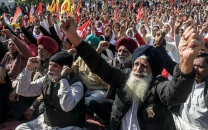

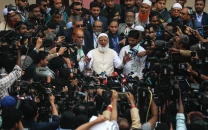

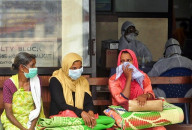












COMMENTS
Comments are moderated and generally will be posted if they are on-topic and not abusive.
For more information, please see our Comments FAQ